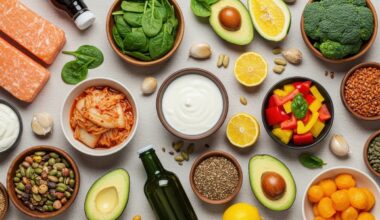Post-Competition Detox: Myth or Must for Bodybuilders?
After the intensity of bodybuilding competitions, many athletes wonder about the efficacy of detoxification strategies. Some people believe that post-competition detox is crucial for recovery, claiming it helps eliminate toxins, restore muscle health, and prepare the body for subsequent training cycles. This belief, however, is largely based on anecdotal evidence rather than scientific research. Although our bodies have natural systems for detoxification, such as the liver and kidneys, the concept of needing to detox after competing may lead to misconceptions. In reality, most bodybuilders can recover effectively without extreme detox regimens. Instead, nourishing the body with proper nutrition and hydration should be the focus. Encouraging clean eating for several days or weeks post-competition will support recovery more than strict detox diets. The inclusion of whole foods, proper macronutrients, and rehydration strategies is vital for optimal muscle recovery and overall health. It’s important to prioritize balanced meals over adhering to rigid detox routines so that the body can recover adequately. This approach may ultimately be more beneficial in helping bodybuilders return to peak performance levels for the next competition.
Understanding the role of nutrition post-competition is crucial for every serious bodybuilder. After a grueling competition, your body needs the right nutrients to repair muscles and replenish energy stores. Focus on consuming lean proteins, complex carbohydrates, and healthy fats to ensure a balanced approach. Including nutrient-dense foods helps mitigate inflammation, promote recovery, and restore glycogen levels, which may be depleted after intense training. Some popular post-competition choices include grilled chicken, quinoa, sweet potatoes, and avocados. Additionally, incorporating a variety of colorful fruits and vegetables ensures that your body receives a wide range of vitamins and minerals, essential for optimal recovery. Hydration also plays a significant role during this recovery period. Consuming enough water and electrolyte-rich fluids can help to prevent dehydration and support kidney function, further facilitating detoxification processes naturally. Avoiding processed foods and sugars contributes to maintaining energy and health during this critical recovery phase. Instead, aim for whole, unprocessed items that support your nutritional goals. In the following sections, we will explore whether detox diets offer real benefits or if traditional nutrition strategies are sufficient.
Debunking Detox Myths
There are several myths surrounding the need for detoxing after competition that deserve to be addressed. One common misconception is that the body accumulates harmful toxins that require removal through specific detox plans. However, studies show our organs, particularly the liver, have evolved precisely for this purpose. They effectively filter and expel toxins without additional support from detox diets or supplements. Another myth is that detox diets will lead to rapid weight loss or improved performance. In reality, the drastic restrictions of detox plans can negatively impact muscle recovery and performance by depriving the body of essential nutrients. Additionally, quick weight loss often leads to muscle loss, which is detrimental to any bodybuilder’s goals. Instead of opt for extreme methods, embrace natural food sources rich in fiber, protein, and antioxidants that uniformly support health. Rather than fearing toxins accumulated during competitions, you should focus on providing your body with ideal nutrition that enhances recovery. Understanding these myths will empower athletes to make informed choices in their post-competition approaches for recovery and overall wellbeing.
One popular detox myth claims that specific detox teas or supplements can cleanse the body more efficiently than natural processes. These products often advertise promises of extreme detox benefits, yet most lack scientific credibility. Many of these detox items are composed of laxatives, diuretics, or other unproven ingredients that may strain the body rather than promote well-being. Relying solely on these products not only misguides the concept of health but may also lead to dependency. Athletes should prioritize their health through balanced nutrition rather than resorting to commercial detox products. Moreover, ineffective detox diets can lead to nutrient deficiencies, muscle wasting, and an increased risk of injury. Educating yourself on healthy recovery methods will ultimately provide better results than any single product could offer. It is crucial to return to regular eating habits and pay attention to nutrient intake while allowing time for your body to naturally detoxify. In the next section, we’ll discuss practical nutrition strategies to focus on for a successful recovery period free from reliance on detox trends.
Nutrition Strategies for Recovery
To promote effective recovery in bodybuilders, adopting strategic nutritional practices is essential. Post-competition, include lean protein sources such as chicken, turkey, or fish to support muscle repair and regrowth. Pair these proteins with complex carbohydrates, like brown rice, sweet potatoes, or whole grains, helping replenish glycogen stores. Healthy fats play a vital role in hormone regulation, aiding recovery; thus, consider incorporating foods like nuts, olive oil, and avocados into meals. It’s also beneficial to stay adequately hydrated, as water assists in nutrient transportation and waste removal. Valuing hydration helps the body maintain optimal functioning throughout the recovery phase. Integrate fruits and vegetables into your meals, emphasizing leafy greens, berries, and cruciferous veggies for their antioxidant properties. These nutrients combat inflammation and promote overall health. Creating balanced meals will ensure recovery is achievable without any unnecessary detox processes. Furthermore, strategic meal timing can enhance performance and recovery further as well. Regular, smaller meals throughout the day will help stabilize energy levels and ensure crucial nutrient supply. Following these guidelines can substantially improve recovery outcomes while preventing fatigue and burnout.
To maximize recovery effectiveness, monitoring micronutrient intake after competitions is a valuable consideration. Vitamins and minerals play fundamental roles in the recovery process, helping to eliminate inflammation and prevent fatigue. Magnesium, for instance, aids muscle function, while vitamin C supports collagen production, essential for repairing torn tissues. Zinc is also crucial for immune function, which helps fend off illness after the stress of competition. Consuming a variety of colorful produce will enhance the intake of these vital nutrients, as fruits and vegetables offer an excellent source of antioxidants beneficial for muscle recovery. Additionally, whole foods are preferable over processed options, as they offer better bioavailability of these nutrients. Consider incorporating options like citrus fruits, nuts, seeds, sweet potatoes, and leafy greens into your meals for a comprehensive array of vitamins and minerals. Seek to create meal plans that promote micronutrient density and enhance the recovery process. In the subsequent section, we will explore the importance of long-term lifestyle choices to maintain optimum health beyond the immediate post-competition recovery phase.
Long-Term Recovery Strategies
Beyond immediate post-competition recovery, bodybuilders should adopt long-term strategies for sustainable health and performance. It’s crucial to transition smoothly back into regular training and nutritional routines while avoiding the temptation to fall back into unhealthy habits. Establishing a consistent workout plan can help support muscle retention, cardiovascular health, and overall fitness. Aim to incorporate varied training protocols that prevent workout monotony and promote muscle adaptation. Regular activity will facilitate more efficient nutrient utilization during recovery stages and help maintain metabolic function. Nutrition must remain prioritized beyond the recovery phase; continuation of balanced meals with plenty of whole food sources is essential. Lifelong practices of mindful eating, goal setting, and meal prepping will enhance your fitness journey and maintain optimal performance levels. Seek to educate yourself continually on nutrition science and fitness trends to support your body in adapting to fluctuations in training intensity. Building a strong support network with fellow athletes can also aid in motivation and accountability, fostering a healthier competitive environment. By embracing holistic health practices, your bodybuilding efforts will lead to lasting success and well-being.
In conclusion, the concept of post-competition detox for bodybuilders is often more myth than necessity. While detoxing trends seem appealing, the human body is designed for self-detoxification and may not require extreme measures. Prioritizing a balanced nutritional approach and focusing on adequate hydration creates a solid foundation for effective recovery. Addressing common myths surrounding detox will empower bodybuilders to avoid unnecessary supplements and commercial products that may not yield desired results. Understanding the essential role of nutrition, micronutrients, and hydration will help bodybuilders facilitate effective recovery strategies and support long-term health. By embracing sustainable habits and lifelong practices for health and wellness, bodybuilders can achieve optimal results post-competition without the pressures of detox fads. Setting the stage for an informed and balanced recovery enables athletes to return to training prepared and energized for future competitions. Your post-competition practices can significantly impact performance, demonstrating the importance of sound recovery strategies. As bodybuilders continue to explore this topic, seeking knowledge and support could lead to greater success in their fitness journeys and healthy lifestyle choices.


